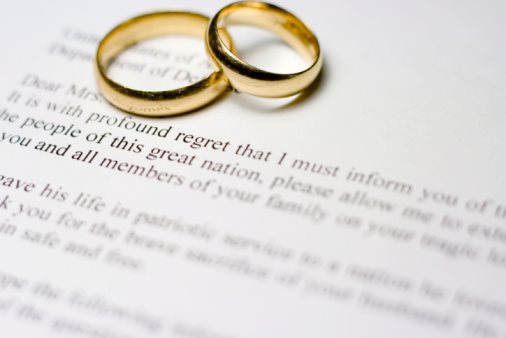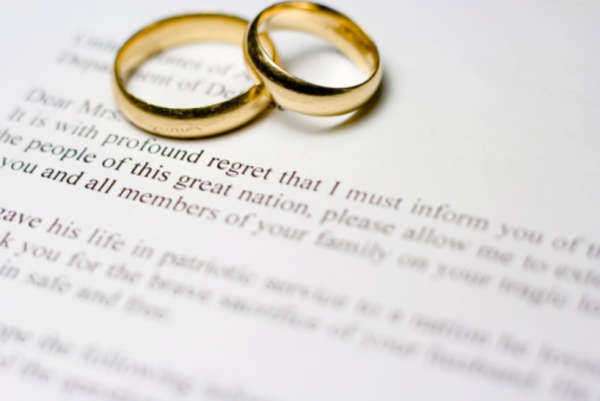Defense of Marriage Act

DEFENSE OF MARRIAGE ACT TEXT
WHAT IS THE DEFENSE OF MARRIAGE ACT?
The DEFENSE OF MARRIAGE ACT (DOMA) is a Federal law enacted on September 21, 1996, by then-President Bill Clinton.
The law essentially leaves it up to the States to decide whether to recognize a same-sex marriage performed in another State that permits such actions. The law came about through the then Republican-controlled Congress.
At the time, same-sex marriages were beginning to spread throughout a minority of states in the Union. Essentially the idea of THE DEFENSE OF MARRIAGE ACT came about to pre-empt the possibility of the State of Hawaii recognizing same-sex marriage.
I THOUGHT THAT MARRIAGE WAS LEFT TO THE STATES?
There is no mention of marriage in the Constitution of the United States and as such the Constitution holds that “the powers not delegated to the United States by the Constitution, nor prohibited by it to the States, are reserved to the States respectively, or to the people.”
Having understood this clause of the Constitution it is perfectly legal for a State to decide that they wish to authorize and recognize same-sex marriage.
What THE DEFENSE OF MARRIAGE ACT specifically pertains to is the right of States to REFUSE to recognize that marriage, even though it is legal in the marital state.
Reading this it is clear that the authority of a State to refuse to recognize a marriage performed in another State flies in the face of the “Full Faith and Credit Clause”, found in Article IV, section 1, of the Constitution that succinctly states that States within the United States shall respect the public acts, records, and judicial proceedings of every other State.
THE DEFENSE OF MARRIAGE ACT, therefore, is essentially a federal mandate that allows States to refuse to recognize the Full Faith and Credit Clause when it comes to recognizing same-sex marriages performed in other states.
WHAT IS GOING ON WITH THE DEFENSE OF MARRIAGE ACT NOW?
Currently, under the Obama Administration, the effect of THE DEFENSE OF MARRIAGE ACT is speculative.
On February 23, 2011, Attorney General Eric Holder announced that the Department of Justice will no longer enforce the defense of marriage act.
There has been some controversy since then as to whether that statement was representative of the Obama administration’s intentions to do away with the act entirely and seek its repeal.
As of today there are a number of court cases pending appeal specifically dealing with the Constitutionality of THE DEFENSE OF MARRIAGE ACT
SO WHERE WILL A SAME-SEX MARRIAGE BE RECOGNIZED?
For the purposes of recognizing same-sex marriage there currently exist only six (6) States within the Union that recognize same-sex marriage.
These include Connecticut, Iowa, Massachusetts, New Hampshire, Vermont, and most recently New York State. In addition, same-sex marriage is legal in The District of Columbia.
Many speculate that THE DEFENSE OF MARRIAGE ACT is on its way out and as more and more states decide to allow same-sex marriage the more likely THE DEFENSE OF MARRIAGE ACT will be gone within the near distant future.
What To Know About the Federal Defense of Marriage Act (DOMA)
The Defense of Marriage Act, sometimes shortened to DOMA, is a federal law in the United States which was signed into the legislature by former President Bill Clinton on September 21, 1996.
In the Federal Defense of Marriage Act 1996, the federal government explicitly defines marriage to be a legal union between a man and a woman.
Under the Federal Defense of Marriage Act 1996, no American state or political subdivision within the United States is required to recognize a marriage within a same-sex relationship that was set in another state.
The Federal Defense of Marriage Act 1996 passed both the House and Senate with a large majority. Section 3 of the Defense of Marriage Act prevents the federal government from acknowledging the legal validity of same-sex marriages.
However, this section has been found to be unconstitutional in a California bankruptcy case, two Massachusetts cases, and by President Obama’s administration. These rulings are still under appeal.
Social Background of the Federal Defense of Marriage Act 1996
When the Federal Defense of Marriage Act 1996 was first passed, it was thought that Hawaii and potentially other states would be quick to legalize same-sex marriage, either by judicial interpretation or legislation of either the federal or state constitution.
Challengers of such recognition worried that other states would then be forced to recognize the validity of these marriages under the authority of the Full Faith & Credit Clause found in the United States Constitution.
Section 2 of the Federal Defense of Marriage Act 1996
According to the Report from the House of Representatives on the Federal Defense of Marriage Act 1996, Section 2, which are the Powers reserved for the states, of the act was written with the intention of protecting the right of the individual States to create their own public policies in terms of the legal recognition of gay marriages and same-sex unions without having any federal constitutional implications that could possibly modify the recognition by one State of the right for same-sex couples to obtain marriage licenses.
This section explicitly provides that no individual State will be required to agree to full faith and to recognize a marriage license that was issued by another state if it is regarding a relationship between homosexual couples.
This basically means that the law upholds the power of each individual state to make the state’s own decision regarding whether the state will reject or accept any same-sex marriages that are created in other states or jurisdictions.
Section 3 of the Federal Defense of Marriage Act 1996
Section 3, or the definition of marriage, of the law, is the portion of the act that legally defines marriage in terms of federal uses as the union explicitly of a woman and a man.
However, this portion of the act was deemed unconstitutional in July 2010 by a federal district court judge. This decision was then appealed three months later.
On February 23, 2011, the Attorney General Eric Holder publically announced that the United States Justice Department would no longer act as the legal defense of Section 3 of the Federal Defense Marriage Act at the instruction of President Barack Obama, who had decided that Section 3 of the Federal Defense Marriage act was unconstitutional.
Despite this, Congress may possibly choose to defend the law in a courtroom instead of through the administration. March 4, 2011, John Boehner (the Speaker of the House) announced that he was taking action in order to defend Section 3 of the Federal Defense of Marriage Act 1996 on behalf of the United States Department of Justice.
Furthermore, the administration wishes to enforce the Federal Defense of Marriage Act 1996 until and unless Congress legally repeals Section 3 of the act or the judicial branch places a definitive verdict against the constitutionality of the section.
Enactment of the Federal Defense of Marriage Act 1996
In the 1993 Hawaiian Supreme Court case Baehr v. Miike, the court ruled that the state of Hawaii must show a strong and compelling interest behind prohibiting same-sex marriage within the state.
This legal action prompted great concern among various opponents of same-sex marriage regarding the possibility that same-sex marriage could become legal in Hawaii resulting in other states having to recognize those marriages as valid.
The enactment of the Federal Defense of Marriage Act 1996 was done in order to free individual states from any sort of obligation in recognizing marriages of homosexual couples in other states.
The Defense of Marriage Act 1996 was authored by Georgia Representative Bob Barr, who was at the time a Republican representative. He then introduced the bill to the House on May 7, 1996.
The Congressional sponsors of the bill stated that the bill worked to amend the United States Code in order to explicitly state what has been implied and understood for over 200 years under federal law.
This fact was that a marriage is only the legal union of a woman and man as wife and husband and that a spouse is a member of the opposite sex.
The bill’s legislative history declares authority to endorse the law under Article IV Section 1 of the Constitution, which gives Congress the power to define the full effect of the credit and full faith each state must give to other states’ acts.
Supporters made clear their intent to regularize heterosexual marriage specifically on a federal level while allowing other states to decide individually whether to acknowledge same-sex unions granted from other states.
The Republican Party platform in 1996 endorsed the Federal Defense of Marriage Act, making references only to Section 2 of the Act.
They felt that anti-discrimination laws should not be distorted so heavily in order to cover sexual preference. Furthermore, the platform also endorsed the Federal Defense of Marriage Act and its ability to prevent states from being legally forced to recognize homosexual unions.
The platform of the Democratic Party in 1996 did not mention the Defense of Marriage Act or marriage in general.
In an interview in June 1996 in The Advocate, the gay and lesbian magazine, Former President Clinton said that he was opposed to same-sex marriage as he felt that marriage was an institution reserved for the union of a woman and a man.
He did not revisit or mention the stance in his autobiography written in 2004. As time progressed, former President Clinton’s personal views regarding same-sex marriage slowly shifted.
In July 2009, Clinton said that he placed his support in individuals doing what they feel they want to do and that others should not stop gay marriage because of it.
He also showed support for gay marriage but felt it should not be a federal question, but rather all states should be in support of it.
The bill for the Federal Defense of Marriage Act moved through Congress on a fast track and found overwhelming approval in both the House and Senate, which were both Republican-controlled.
The bill passed with a vote in the Senate of 85–14 and a vote in the House of Representatives of 342–67. On September 21, 1996, the act was signed into legislation by President Bill Clinton.
Recognition of Gay Marriage In Response to the Defense of Marriage Act
Since the enactment of the Federal Defense of Marriage Act 1996, many states have allotted licenses for same-sex marriages.
These states include the District of Columbia, New York, Massachusetts, New Hampshire, California, Connecticut, Iowa, and Vermont.
Maryland and New Mexico recognize homosexual marriages set from other jurisdictions. California, Illinois, Hawaii, New Jersey, and Nevada also recognize such a marriage as a domestic partnership or civil union.
Certain states recognize civil unions in order to represent homosexual relationships and make these relationships equivalent to marriage.
Other states such as Nevada have domestic partnerships in order to grant same-sex relationships some legal status and benefits that the state normally places on married couples.
A majority of the states have very restricted recognition of marriage limited to one woman to one man.
Up until April 2009, 29 states in the United States have created constitutional amendments that define marriage as the union of a woman and a man, while another 13 states have set up statutory bans, that approved a gay marriage law that was first repealed by referendum in the general elections of 2009.
Later Politics of the Federal Defense of Marriage Act 1996
The Republican Party platform in 2000 endorsed the Defense of Marriage Act in overall terms but presented a concern about potential judicial action.
The party continued to hold the stance that federal law should not force other states to recognize other arrangements besides one woman and one man as marriages.
The same year, the Democratic Party platform did not mention the Defense of Marriage Act or marriage within this context.
In 2008, Congressman Barr publicly apologized for sponsoring the Defense of Marriage Act and stated that the law should be repealed on the basis that the act violated the principles of federalism.
The Defense of Marriage Act (DOMA) is a piece of legislation that was signed into law on September 21, 1996. The act defines marriage as a legal union between one man and one woman, and it allows states to refuse to recognize same-sex marriages performed in other states. The law has been controversial since its inception, with arguments on both sides about the effects of DOMA on same-sex couples and the larger issue of LGBT rights in the United States.
DOMA Overview
The main purpose of the Defense of Marriage Act was to define marriage as a legal union between one man and one woman and to establish federal law to prevent same-sex marriages from being recognized under federal law. The law will allow states to refuse to recognize same-sex marriages in other states. This has prolonged the controversial debate over the definition of marriage and the rights of LGBT individuals. DOMA was signed into law by President Bill Clinton in 1996, but it has played a role in many legal battles since then.
DOMA was codified as Title 1, Section 7 of the United States Code, and it has two separate sections. The first section establishes the legal definition of marriage as between one man and one woman. The second section addresses the issue of same-sex marriage, stating that no state is required to recognize a same-sex marriage that was performed in another state.
Supreme Court Ruling
The Supreme Court heard two cases relating to DOMA in 2013: United States v. Windsor and Hollingsworth v. Perry. The first case involved a woman named Edith Windsor, who sued the federal government for recognizing her marriage to her same-sex spouse, Thea Spyer, who had recently passed away. The couple had been married in Canada, where same-sex marriage was legal, but because of DOMA, Windsor was not eligible for the same federal benefits that a widow in an opposite-sex marriage would be. She argued that the law discriminated against her because of her sexual orientation, and the Supreme Court ultimately agreed. In a 5-4 decision, the court struck down Section 3 of DOMA, which defined marriage as between one man and one woman.
The second case, Hollingsworth v. Perry, dealt with California’s Prop 8, a ballot measure that banned same-sex marriage in the state. The Supreme Court declined to rule on the constitutionality of the measure itself, but it did vacate the Ninth Circuit Court of Appeals decision that had struck down Prop 8, effectively legalizing same-sex marriages in California. While the decision was not a direct result of DOMA, it was a significant victory for proponents of marriage equality.
Aftermath of Supreme Court Ruling
Following the Supreme Court’s ruling on DOMA, same-sex couples were able to receive federal benefits if they were married in a state where same-sex marriage was legal. For example, a legally married same-sex couple could file a joint tax return or receive spousal benefits from Social Security. The ruling was widely celebrated by proponents of marriage equality, as it was seen as a victory for equal rights and a step in the right direction for LGBT individuals.
However, the fallout from the Supreme Court’s decision was not entirely positive. While same-sex couples in states where same-sex marriage was legal were able to receive federal benefits, those in states where it was not still faced discrimination. This led to a patchwork of laws across the country, with some states recognizing same-sex marriages and others refusing to do so.
Additionally, the ruling did not extend to all federal benefits. For example, some benefits offered by the Veterans Administration and the Department of Defense were still not available to same-sex couples. This led to further legal battles and calls for Congress to pass additional legislation to ensure that all federal benefits were available to married same-sex couples.
Repeal of DOMA
In June 2015, the Supreme Court issued another landmark ruling in the case of Obergefell v. Hodges. The case dealt with the question of whether states could ban same-sex marriage, and the court ruled that they could not. This effectively legalized same-sex marriage across the entire country, and it represented a significant victory for the LGBT community.
As a result of the ruling, DOMA was effectively repealed. While the law was not explicitly struck down, the court’s decision that same-sex couples had a constitutional right to marry meant that the law was no longer enforceable. This was a significant accomplishment for the LGBT community, as it represented a significant step towards full equality under the law.
Criticism of DOMA
DOMA has been criticized by LGBT rights advocates and legal scholars since its implementation. One of the primary concerns has been that the law discriminates against same-sex couples and denies them the same rights and privileges that are extended to opposite-sex couples. Additionally, opponents argue that the law reinforces negative stereotypes about homosexuality and perpetuates discrimination and prejudice.
Critics of the law also argue that it is unconstitutional, as it violates the Equal Protection Clause of the Fourteenth Amendment. This clause mandates that all citizens be treated equally under the law, and opponents argue that DOMA violates this principle by denying same-sex couples the same rights and protections that are given to opposite-sex couples.
Supporters of DOMA argue that the law reflects the traditional view of marriage and is an important moral principle for many Americans. They also argue that the law promotes stability in society by encouraging families that are based on traditional marital principles.
Conclusion
The Defense of Marriage Act was a landmark piece of legislation that defined marriage as between one man and one woman and prevented same-sex couples from receiving federal benefits. The law was controversial from its inception, with proponents arguing that it upheld traditional values and opponents arguing that it denied equal rights to same-sex couples.
After years of legal battles, the Supreme Court ultimately struck down Section 3 of the law in 2013, and Obergefell v. Hodges effectively repealed the law two years later. While the law is no longer in effect, its legacy lives on in the ongoing debates over LGBT rights and marriage equality.



















